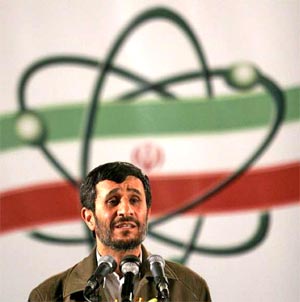http://www.google.com/hostednews/afp/article/ALeqM5i2ocQGHwmL7ywFisav8bc_ISSnvQ
Secretary of State Hilary Clinton has urged Iran to accept the IAEA nuclear proposal. There still has been no official statement from Iran regarding this plan. The United States is concerned that Iran's response may last longer than expected.
UPDATE ON IRAN'S DECISION ON NUCLEAR PROPOSAL: OCTOBER 29, 2009
http://www.nytimes.com/2009/10/30/world/middleeast/30nuke.html?_r=1&ref=global-home
On October 29th Iran rejected the nuclear plan to send out most of its uranium to other countries. The main purpose of this plan was to let Iran send most of its uranium, so there would not be enough uranium to enrich to a nuclear weapon. And when the other countries return the enriched uranium, it would be in the form of fuel rods, which are used for energy and are difficult to use for nuclear weapons. Iran wanted to keep the uranium they have currently and buy enriched uranium from other countries.
correction (11/1/09): In this update it seems as though Iran's rejection is definite. Although many head leaders of Iran have expressed their rejection of this plan, there still has been no official public statement.

Iran said that it might accept the proposed nuclear agreement that was created during the talks with Iranian, French, American, and Russian diplomats in Vienna on October 21st. Is Iran purposely leaving everyone confused about its future plans? Is Iran trying to lengthen this in order to secretly continue its nuclear plans? Iran is schedule to give a response to the IAEA and the UN, on this plan, by tomorrow. In the deal it states that Iran should send its uranium to Russia and France in order for the uranium to be enriched 20%. But Iran wanted to purchase 20% enriched uranium from other countries. The final decision is up to The Supreme National Security Council in Iran. But what happens if Iran disagrees with the plan and does not accept it? It would be a huge setback for the future of Iran's nuclear program and the relations between Iran and the United States. The future of the relationship between Iran and the US cannot be constructive if Iran does not accept this plan. It is the concern of the United States and many other nations that Iran might be building nuclear weapons. Through this plan of Iran sending most of its uranium to other countries to be enriched, might settle some fears about the possibility of Iran having enough enriched uranium to build nuclear weapons. But does not Iran have a right to disagree with certain parts of this plan? Iran is probably thinking of the best ways that will help grow their nuclear program in order to use nuclear energy peacefully. The only problem is that there are doubts to how peaceful is the nuclear program. Countries, like the United States, doubt the peaceful purposes of this nuclear program and this also influences the diplomacy and building of a transparent and more constructive relationship with Iran. It will be interesting to see if Iran agrees with the plan. If not, then there will be more talks with Iran, lengthening this process and this could hinder the relationship that Iran and the United States were trying to build.
This article is from the Tehran Times. It is discussing the feeling the leaders of Iran have towards the IAEA proposal created in Vienna.
http://www.tehrantimes.com/index_View.asp?code=206587
This article is from BBC News. It is discussing about Iran's ideas of changing parts of the proposal.
http://news.bbc.co.uk/2/hi/middle_east/8327558.stm
This article also discusses Iran's wishes of changing parts of the nuclear proposal.
http://www.philly.com/inquirer/world_us/20091028_Iran_seeks_changes_to_nuclear_deal.html
The picture is from this website.
http://www.iranian.com/main/2009/oct/balance-deterrence-or-catastrophe
My personal opinion on this issue, as I have commented on before, is that I do not believe that the United States should care that strongly about Iran's nuclear program. We have weapons of mass destruction and no one has interfered with our programs. Who gave us the power to be in charge of the world? However the general question of my comment is: What evidence is there that gives other nations the idea that Iran is creating a nuclear program that is not peaceful?
ReplyDeleteIt is interesting to compare how countries interfere with their nuclear programs. Although many countries did not interfere with the United States' nuclear program, many countries now are being involved in Iran's nuclear program. I do not think that the United States should totally control Iran's nuclear program, I think by discussing this program with Iran, it allows the United States and Iran to improve their relationship. Although it may seem as though nothing is being accomplished through these talks with Iran, at least it is on the right track. In the previous administration in the United States, there were hardly any talks held with Iran. This is a great improvement.
ReplyDeleteThe concern regarding the intentions of Iran's nuclear program is from many past events. Over the past year or so the IAEA reported that Iran had enough uranium to create a nuclear weapon (http://www.america.gov/st/peacesec-english/2009/February/20090220104627dmslahrellek0.0356409.html). Also with the recent announcement about the new nuclear facility in Iran, has raised concerns as to whether or not Iran is willing to be transparent regarding its information on its nuclear program. There needs to be more transparency regarding Iran's nuclear program in order to distinguish if it is peaceful or not.